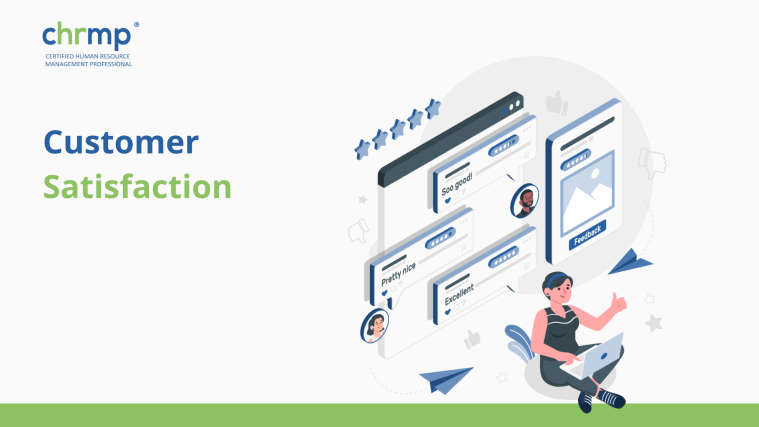

Keeping customers satisfied is the key to any business. It’s much easier to retain a satisfied customer than to try and win back an unhappy one.
But how can customer satisfaction be achieved? Well, that’s what we will be exploring here in this blog. From understanding your customers’ needs and preferences to implementing effective communication strategies and creating a positive overall satisfied customer experience. Building a loyal customer base is what the whole game is about.
So, whether you’re a small business owner, a customer service representative, or simply someone who wants to improve their interpersonal skills, this blog is for you. We’ll be your guide on the path to customer satisfaction and help you create a loyal customer base that will keep your business flourishing.
So, sit back, relax, grab a cup of coffee and get ready to make some happy customers!
The feeling of contentment and happiness a customer experiences after purchasing a product or service from a company is called customer satisfaction. It’s a measure of how well a business meets or if at all sometimes exceeds the expectations of its customers.
When a customer is satisfied with a product or service, they are more likely to become a repeat customer or recommend the company and product to others, and generate positive reviews and feedback.
Customer satisfaction is essential for the long-term success of any business. Satisfied customers not only create repeat business and increase revenue and profits, but they also contribute to building a positive brand image and reputation in the market. On the other hand, dissatisfied customers can cause negative word-of-mouth advertisement about the company concerned and damage its reputation and image in the market.
Customer satisfaction is typically measured through surveys, interviews and feedback systems that allow customers to provide their opinions on the product or service they received from the company. This feedback or review is used by companies for product or service improvement and address customer complaints, to keep customers satisfied and find new ones.
Customer satisfaction is critical for the long-term success of a business. Here are the reasons as to why:
Satisfied customers more often than not become repeat customers, increasing a company’s revenue ,sales and profitability. They also make larger purchases than first-time customers and spend more money.
Satisfied customers recommend a company to their friends and family, resulting in free and very effective advertising. This leads to new customers and increased revenue and sales.
Building brand reputation is extremely important to win the competition in the market. A high level of customer satisfaction can contribute to a positive brand reputation, making it easier for a company to attract new customers and retain existing ones. Building brand reputation is certainly time taking activity but very rewarding in terms of company success.
It is a valuable tool for companies, which also generates positive word of mouth advertisement.
Satisfied customers are more likely to be loyal to a company, even if a competitor offers a similar product or service. This loyalty can lead to long-term, profitable relationships.
It’s always less expensive to retain satisfied customers than to win back unhappy one’s and acquiring new ones, of course, is altogether a different and expensive ballgame to expand business baseline. Satisfied customers are less likely to require repetitive extensive customer service or support, and they tend to be easier to sell products to, than new customers.
Customer satisfaction is crucial for the success and growth of any business. Here are the top three benefits of customer satisfaction:
Satisfied customers are more likely to remain loyal to a business and continue purchasing its products or services. When customers have a positive experience and their needs are consistently met, they are more inclined to become repeat customers.
They are also more likely to recommend the business to others, which can lead to new customers through positive word-of-mouth. By prioritizing customer satisfaction, businesses can foster long-term relationships, reduce customer churn, and create a loyal customer base.
Satisfied customers not only return for repeat purchases, but they also tend to spend more. When customers are pleased with a business, they are more likely to explore additional products or services, upgrade to higher-priced options, or make larger purchases.
This increased spending contributes to revenue growth and profitability. Moreover, satisfied customers are more willing to engage in upselling and cross-selling efforts, leading to additional revenue streams.
As customer satisfaction improves, businesses can experience sustained growth and higher financial performance.
Customer satisfaction plays a crucial role in shaping a business’s brand image and reputation. When customers have positive experiences and are satisfied with a business, they are more likely to view it favorably and speak positively about it to others.
This positive sentiment enhances the brand’s reputation and credibility in the market. A strong reputation for customer satisfaction can differentiate a business from its competitors and attract new customers who are seeking reliable and trustworthy products or services.
A positive brand image can lead to increased market share, customer acquisition, and competitive advantage.
Here are some common ways to collect feedback and measure customer satisfaction:
Conducting customer satisfaction surveys and interviews to collect customer opinion is a popular and effective way to measure their satisfaction. Surveys can be sent via email, phone, or mail, including questions about product quality, customer service, and the overall purchase experience.
NPS is a popular method for measuring customer satisfaction and testing brand loyalty. It involves asking customers to rate the likelihood of recommending a company on a scale of 0-10 to their friends and relatives. Based on their responses, customers are categorized as promoters (score of 9-10), passives (score of 7-8), or detractors (score of 0-6).The promoters are the most likely ones to create positive word of mouth advertisement.
Feedback forms should be customarily provided to customers after they make a purchase, visit a store, or use a service. These forms include questions about product quality, customer service, and overall purchase experience.
Social media platforms are used to monitor customer feedback, complaints, recommend actions and other such sentiment. Companies can track mentions, comments, visits and reviews on social media to gauge customer satisfaction and to address any negative feedback or complaint.
Tracking and analyzing customer complaints can provide valuable insights into areas where a company can improve to increase customer satisfaction. Sieving through the complaints section to recognise and address the actual one’s and filter out the spam complaints is crucial.
Achieving higher levels of customer satisfaction requires a deliberate, consistent effort and a commitment to providing quality products and services, as well as satisfactory customer service.
Here are five tips for increasing customer satisfaction and building brand loyalty. Whether you are a small business owner or a customer service professional, these insights help create a positive customer experience for your company and build a strong customer base for your business:
Customers appreciate polite and professional service, and it can make a huge difference in their overall purchase experience. Make sure your customer service representatives are friendly, knowledgeable, well mannered, responsive and professional. Training has to be given to customer representatives about how to handle customer complaints and inquiries effectively, and to provide personalized assistance whenever possible.
Quality is not to be played the fool with. Customers expect quality products or services that meet their needs and expectations. Make sure your products are reliable, durable, and meet or exceed industry standards. If you offer a service, ensure that it’s delivered with professionalism, expertise, and attention to detail which will certainly drive up the revenue and profit metrics.
Customers want to feel valued and appreciated. Personalizing the customer experience by addressing customers by name, sending personalized messages, and offering tailored recommendations can help build strong relationships and increase customer satisfaction. Strong customer relationships help in building brand loyalty for years together.
Actively listen to your customers to collect their feedback through surveys, interviews, feedback forms, and social media monitoring. Use this feedback to identify areas for improvement, address customer complaints, and make changes to your products or services to meet their needs and expectations as per industry standards.
Customers appreciate transparency and honesty from companies. Be straightforward and upfront about your policies, pricing, and product or service details. Communicate clearly and honestly about any issues or challenges that may arise, and work upon it to resolve them quickly and effectively as per customer satisfaction.
If you implement these tips you can increase customer satisfaction, build strong relationships with your customers, work on building brand loyalty which definitely will drive your business success to greater heights.
Q 1. Why is customer satisfaction important for businesses?
Answer: Customer satisfaction is vital for businesses as it directly impacts their success. Satisfied customers are more likely to remain loyal, make repeat purchases, and recommend the business to others. Positive customer experiences also contribute to brand reputation, customer retention, and long-term profitability.
Q 2. How can businesses measure customer satisfaction?
Answer: There are several methods to measure customer satisfaction. Common approaches include surveys (such as Net Promoter Score or Customer Satisfaction Score), feedback forms, online reviews, social media monitoring, and customer interviews. These methods provide insights into customer perceptions, expectations, and areas where improvements can be made.
Q 3. What are the benefits of improving customer satisfaction?
Answer: Improving customer satisfaction yields several benefits. Satisfied customers are more likely to become loyal advocates who refer others, thereby expanding the customer base. Positive word-of-mouth and online reviews enhance brand reputation, attracting new customers. Additionally, high customer satisfaction often leads to increased customer lifetime value and revenue growth for the business.
Q 4. How can businesses address customer complaints or dissatisfaction?
Answer: When customers express dissatisfaction or lodge complaints, businesses should respond promptly and empathetically. This involves actively listening to customers, acknowledging their concerns, and offering appropriate solutions or compensation when necessary. By addressing issues effectively and providing a positive resolution, businesses can turn dissatisfied customers into loyal ones.
Q 5. How can businesses improve customer satisfaction in the long term?
Answer: Improving customer satisfaction requires a holistic approach. This includes understanding customer needs and expectations, delivering consistent quality products or services, providing excellent customer service, personalizing interactions, and continuously seeking feedback to identify areas for improvement. Building a customer-centric culture and fostering strong relationships with customers are also key to long-term customer satisfaction.
In conclusion, customer satisfaction and brand loyalty is a vital factor for the success of any business.
The focus should be on providing excellent customer service, high-quality products or services, personalized at the same time professional customer support, active listening, and transparency in business dealings can improve customer satisfaction and build a strong relationship with the customers. It’s necessary to regularly measure customer satisfaction to identify areas of improvement and maintain a high level of customer satisfaction.
This is one very tricky but vital metric to be evaluated , sustained and nurtured carefully.With the right approach, companies create a positive customer experience, build a loyal customer base to drive long-term business success. Customer satisfaction is not just a metric to measure, but a mindset to adopt to create a culture of customer-centricity in your business. Customer satisfaction ensures the cash registers a-jingling.
© 2007-2025 CHRMP| All Rights Reserved | Powered by Ripples Learning & Research Private Limited
